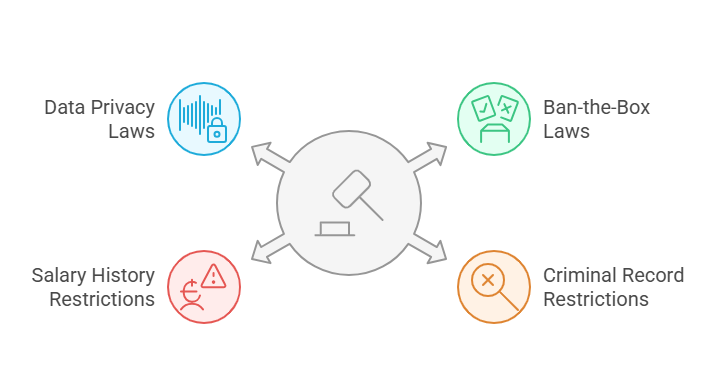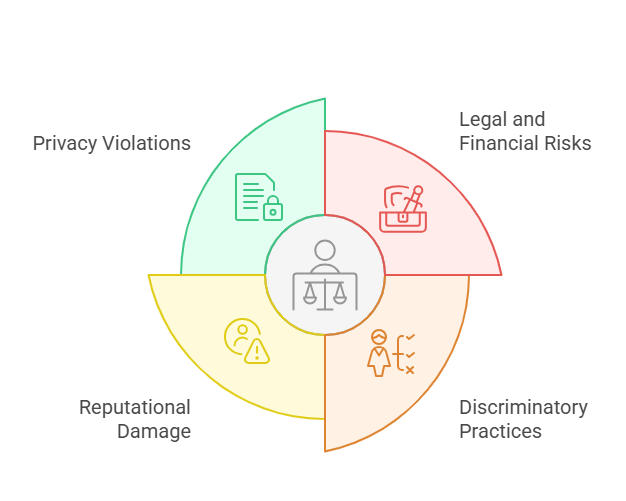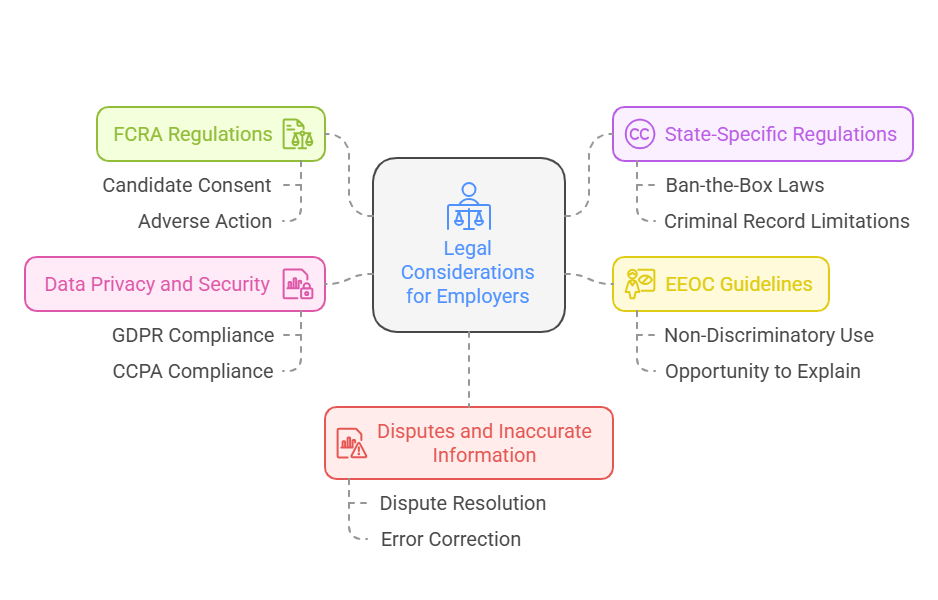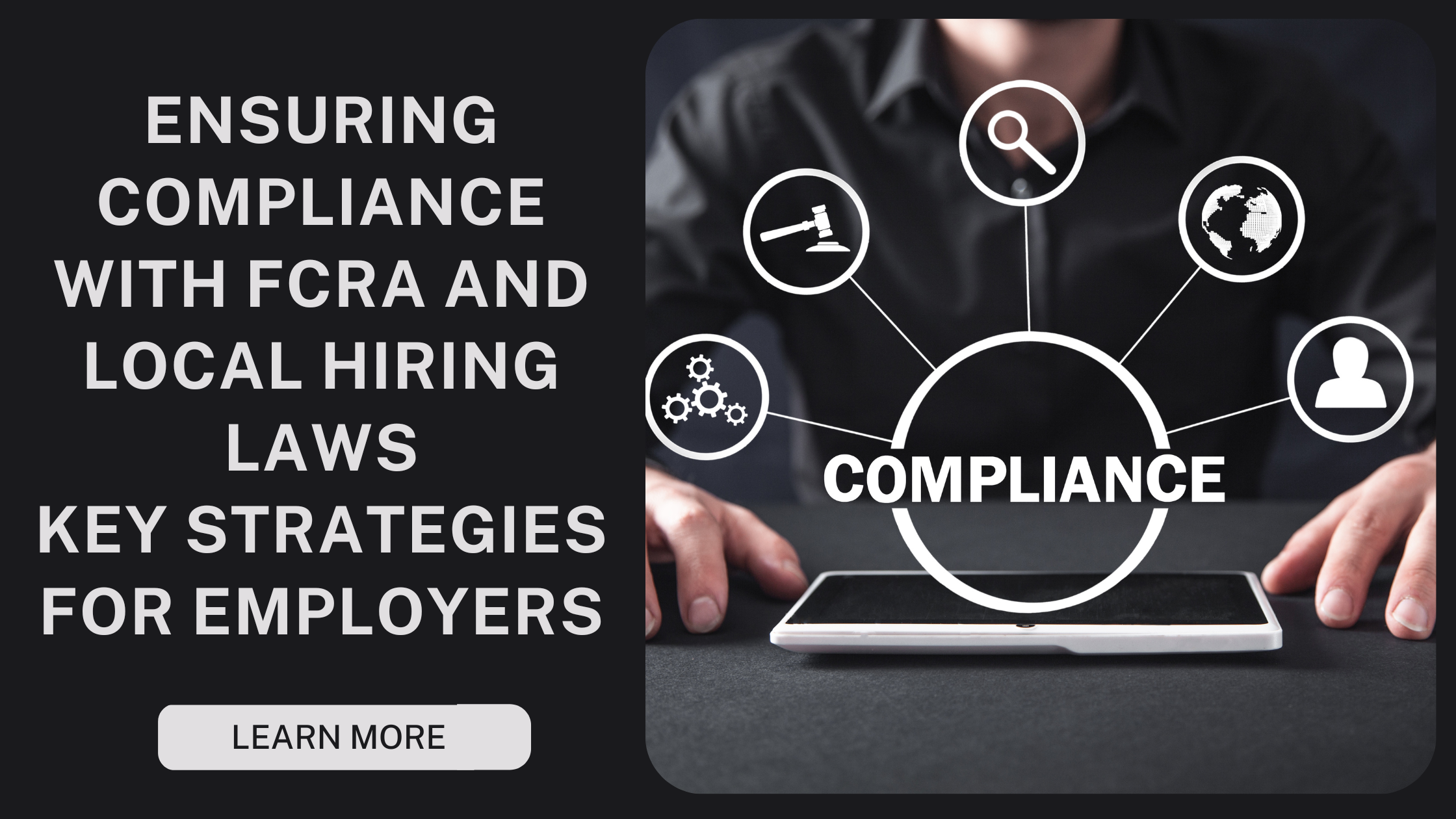Understanding Background Check Compliance and Its Importance
Background checks play an integral role in the hiring process, allowing employers to assess the qualifications, character, and integrity of potential employees. However, these checks are not simply about gathering data; they are subject to strict regulations that ensure fairness, accuracy, and privacy. Compliance with laws such as the Fair Credit Reporting Act (FCRA) and various state-specific regulations is essential for maintaining the integrity of the process. In this section, we will examine the importance of compliance in background checks, including the FCRA and local laws, and why employers must adhere to these legal frameworks.
What is the FCRA and Why Does It Matter?
The Fair Credit Reporting Act (FCRA), enacted in 1970, is a federal law that governs the collection, dissemination, and use of consumer information, including background checks used in the employment process. The FCRA was created to ensure that employers conduct background checks in a fair and non-discriminatory manner while protecting the privacy and rights of candidates. The law outlines several important requirements for employers:
- Consent and Disclosure: Before conducting a background check, employers must obtain written consent from the candidate. The FCRA also requires that employers inform candidates about their rights in the process.
- Adverse Action: If an employer decides not to hire a candidate based on the results of the background check, they must notify the candidate and provide a copy of the report. The candidate must also be given the opportunity to dispute any inaccurate information in the report.
- Accuracy and Privacy: Employers must ensure that the information provided in background checks is accurate, up-to-date, and used only for employment purposes. They must also take steps to protect the privacy of the candidate’s sensitive information.
Non-compliance with the FCRA can lead to significant legal risks, including lawsuits from candidates, penalties, and reputational harm. As a result, employers must be vigilant in ensuring that their background check processes comply with the FCRA.
Local and State-Specific Laws
In addition to federal regulations under the FCRA, employers must also be aware of state-specific laws that affect the background check process. These laws can vary significantly depending on the jurisdiction, and failure to comply with them can result in legal challenges. Some common examples of state-specific regulations include:

- Ban-the-Box Laws: These laws prohibit employers from asking about criminal history on job applications. They are designed to give candidates a fair chance at employment without being automatically disqualified due to past convictions. Ban-the-Box laws exist in many states and cities, though the specifics of the law can vary widely by location.
- Criminal Record Restrictions: Some states have specific rules regarding the use of criminal records during the hiring process. For example, certain states may prohibit employers from considering arrests that did not lead to convictions, or limit the types of convictions that can be used to make hiring decisions.
- Salary History Restrictions: Several states have passed laws that prevent employers from asking candidates about their salary history. These laws aim to address pay inequality by ensuring that a candidate’s past compensation does not influence their potential earnings at a new company.
- Data Privacy Laws: With the rise of data privacy concerns, many states have enacted laws to protect candidates’ personal information. For example, California’s California Consumer Privacy Act (CCPA) gives residents the right to know how their data is being used and to request that companies delete their personal information.
Why Compliance Matters for Employers
Compliance with FCRA and state-specific laws is critical for employers, as failure to adhere to these regulations can lead to severe consequences:

- Legal and Financial Risks: Employers who violate the FCRA may be subject to legal action, including lawsuits and penalties. For example, candidates who are not informed of their rights or who are denied employment based on inaccurate information can sue employers for damages. Non-compliance with state laws can also result in state-imposed fines or sanctions.
- Discriminatory Practices: Employers must ensure that their background check processes do not inadvertently lead to discriminatory practices. The Equal Employment Opportunity Commission (EEOC) enforces laws that prohibit discrimination based on factors such as race, gender, and disability. Using background checks in a discriminatory manner can lead to lawsuits and reputational damage.
- Reputational Damage: Employers who fail to comply with background check regulations may find their reputation damaged in the public eye. Candidates who feel their rights have been violated may share their experiences, leading to negative publicity for the company. This can hinder the employer’s ability to attract top talent.
- Privacy Violations: Data privacy is an increasingly important issue, and employers must take steps to ensure that candidate information is stored and shared securely. Failing to comply with data privacy laws such as the General Data Protection Regulation (GDPR) or CCPA can result in penalties and loss of trust from candidates.
Table: Key Legal Compliance Requirements for Background Checks
| Compliance Requirement | Description |
|---|---|
| FCRA Compliance | Ensures candidates are notified and give consent before a background check. Employers must also provide a report if the candidate is rejected based on the results. |
| State-Specific Laws | Varies by location, but includes rules like Ban-the-Box or restrictions on the types of criminal records that can be used. |
| Equal Employment Opportunity (EEOC) | Ensures no discrimination in hiring based on protected categories such as race, gender, or disability. |
| Data Security | Ensures sensitive candidate information is stored and shared securely in compliance with privacy laws. |
Adhering to the legal requirements in background checks is not only crucial for avoiding legal trouble, but it also ensures a fair, transparent, and efficient hiring process. In the next section, we will examine how RapidHireSolutions ensures compliance with these laws and how it stands out in the background check industry in terms of legal adherence.
Comparison of Compliance – RapidHireSolutions vs Competitors
In today’s competitive hiring environment, employers must choose background check providers that not only offer comprehensive services but also ensure full compliance with the Fair Credit Reporting Act (FCRA) and state-specific laws. Failure to comply with these laws can expose employers to legal risks and reputational damage. In this section, we will compare RapidHireSolutions with competitors, focusing specifically on their compliance with key legal and regulatory requirements. This comparison will highlight why RapidHireSolutions is a reliable and trustworthy choice for employers who want to mitigate compliance risks.
Compliance Comparison Table: RapidHireSolutions vs Competitors
| Compliance Feature | RapidHireSolutions ✅ | Competitor A ❌ | Competitor B ❌ |
|---|---|---|---|
| FCRA Compliance | ✅ Fully compliant | ❌ Potential non-compliance | ❌ Issues in compliance |
| State-Specific Laws | ✅ Adheres to local laws | ❌ Limited compliance | ❌ Limited compliance |
| EEOC Guidelines | ✅ Strict adherence | ❌ Non-compliant | ❌ Discrepancies |
| Data Privacy & Security | ✅ High-level encryption | ❌ Vulnerabilities | ❌ Non-compliant |
| Consent & Disclosure Process | ✅ Transparent and clear | ❌ Lack of transparency | ❌ Lack of transparency |
Why Choose RapidHireSolutions for Compliance?
RapidHireSolutions is a standout provider when it comes to ensuring compliance with the FCRA and local regulations. Here’s how they align with these important legal requirements:
- FCRA Compliance: RapidHireSolutions follows the strictest standards set by the FCRA. Before conducting any background check, they obtain explicit written consent from candidates. They also ensure that candidates are notified about their rights throughout the process. Additionally, if a candidate is rejected based on the results of a background check, RapidHireSolutions ensures that the candidate receives a copy of the report and has an opportunity to dispute any inaccuracies.
- State-Specific Laws: RapidHireSolutions understands that state laws vary significantly and have a direct impact on the background check process. Whether it’s Ban-the-Box laws, restrictions on criminal records, or limitations on salary history inquiries, RapidHireSolutions customizes its process to comply with these regulations in every jurisdiction. This approach helps employers avoid legal pitfalls and ensures that their hiring processes remain in line with regional laws.
- EEOC Compliance: The Equal Employment Opportunity Commission (EEOC) enforces rules that prevent discrimination based on race, gender, age, and other protected characteristics. RapidHireSolutions ensures that their background checks do not inadvertently lead to discriminatory practices. Their screening processes are designed to be fair and consistent, and they emphasize non-discriminatory use of background check results, ensuring employers remain compliant with EEOC guidelines.
- Data Privacy and Security: Given the sensitive nature of background check data, it is essential that employers partner with providers who prioritize data security. RapidHireSolutions uses advanced encryption technologies and other safeguards to ensure that candidates’ personal information is securely stored and transmitted. This high-level commitment to data privacy helps employers comply with laws like the General Data Protection Regulation (GDPR) and the California Consumer Privacy Act (CCPA), ensuring the confidentiality of sensitive data.
- Consent and Disclosure: RapidHireSolutions follows a transparent and clear process for obtaining consent from candidates and notifying them of their rights. This transparency reduces the likelihood of mistakes or misunderstandings during the background check process, ensuring compliance with both the FCRA and state-specific requirements.
Data Table: Compliance Metrics and Turnaround Time
When selecting a background check provider, employers must also consider how quickly they can receive results. RapidHireSolutions’ commitment to compliance is matched by its fast turnaround times, ensuring that employers can proceed with their hiring decisions without unnecessary delays. The following table compares RapidHireSolutions with competitors on key compliance metrics and turnaround time.
| Service Provider | FCRA Compliance | State Law Adherence | EEOC Compliance | Data Security | Turnaround Time |
|---|---|---|---|---|---|
| RapidHireSolutions | ✅ 100% | ✅ Full compliance | ✅ Full compliance | ✅ Secure encryption | ✅ 24 hours |
| Competitor A | ❌ Partial | ❌ Limited compliance | ❌ Issues in compliance | ❌ Vulnerable data | ❌ 15-20 days |
| Competitor B | ❌ Issues | ❌ Limited compliance | ❌ Discrepancies | ❌ Non-compliant | ❌ 10 days |
RapidHireSolutions: Compliance and Speed Combined
RapidHireSolutions stands out not only in terms of compliance but also in turnaround time. While competitors often face delays of 10 to 20 days, RapidHireSolutions provides background check results in just 24 hours, ensuring that employers can move forward quickly without compromising on compliance.
Additionally, competitors’ non-compliance and security vulnerabilities increase the legal risks employers face, potentially exposing them to lawsuits, fines, and reputational harm. By choosing RapidHireSolutions, employers mitigate these risks and gain a trusted partner who values both legal adherence and efficient service.
Why Compliance is a Key Differentiator for Employers
Compliance with FCRA and state-specific regulations is not optional – it is a legal requirement. Employers must ensure they partner with background check providers who are well-versed in these complex laws. By selecting RapidHireSolutions, businesses are assured of a service that not only meets the legal requirements but also prioritizes transparency, fairness, and data security.
RapidHireSolutions goes beyond just providing a compliant service. Their commitment to fast turnaround times and customized solutions based on state-specific laws makes them an ideal partner for employers who value both efficiency and compliance.
Legal Considerations for Employers
When utilizing background check services, businesses must be aware of the complex legal landscape that governs the process. In this section, we will explore the key legal considerations that employers should keep in mind when using services like RapidHireSolutions for background checks. These considerations ensure that employers comply with federal, state, and local regulations, safeguarding both the company and the candidates involved in the hiring process.

1. FCRA Regulations: Candidate Consent and Adverse Action
The Fair Credit Reporting Act (FCRA) is a federal law designed to promote fairness and accuracy in the background check process. Under FCRA, employers are required to obtain written consent from candidates before initiating a background check. This means that candidates must be fully informed and agree to the background check before any personal data is collected.
Adverse action refers to the steps an employer must take if they decide not to hire a candidate based on the results of a background check. Employers are obligated to provide the candidate with a copy of the background report and a notice of adverse action, which informs the candidate of the reason for the hiring decision.
Failing to follow these FCRA requirements can expose employers to significant legal risks, including lawsuits and fines. RapidHireSolutions ensures that all its background check processes align with FCRA standards, guaranteeing that employers receive the proper documentation and follow the necessary procedures.
2. State-Specific Regulations: Ban-the-Box and Criminal Record Limitations
In addition to FCRA regulations, state-specific laws add another layer of complexity to background checks. Some states have implemented Ban-the-Box laws, which prohibit employers from asking about a candidate’s criminal history on the initial job application. Instead, employers can inquire about criminal records only after making a conditional offer of employment.
Other states impose restrictions on which criminal records can be considered during the hiring process. For example, certain jurisdictions prevent employers from considering arrest records or convictions that are older than a specific number of years.
RapidHireSolutions is committed to ensuring full compliance with these state-specific laws by customizing its background check services to meet the legal requirements of each jurisdiction. This ensures that employers can confidently navigate the complex regulatory landscape and avoid potential violations.
3. EEOC Guidelines: Avoiding Discriminatory Practices
The Equal Employment Opportunity Commission (EEOC) enforces regulations that ensure fairness in the hiring process. Under EEOC guidelines, employers must avoid discriminatory practices based on protected characteristics such as race, color, national origin, sex, disability, and religion.
When using background checks, employers must ensure that the information is used consistently and fairly. For instance, criminal background checks should not be used to disqualify candidates based on racial or ethnic bias. EEOC guidelines require that employers provide applicants with an opportunity to explain any negative background check results and demonstrate that the decision is based on relevant job qualifications.
RapidHireSolutions helps employers comply with EEOC guidelines by offering consistent and non-discriminatory background screening services. Their background checks are designed to minimize bias, ensuring fair treatment for all candidates.
4. Data Privacy and Security Considerations
Background checks involve the collection and sharing of sensitive personal information, making data privacy a critical consideration for employers. Laws such as the General Data Protection Regulation (GDPR) in Europe and the California Consumer Privacy Act (CCPA) impose strict requirements on how personal data should be handled, stored, and shared.
Employers must ensure that the information collected during background checks is securely stored and transmitted, and that candidates’ privacy rights are protected. RapidHireSolutions uses state-of-the-art encryption technologies to protect sensitive information, ensuring full compliance with data protection laws and minimizing the risk of data breaches.
5. Disputes and Inaccurate Information
A critical aspect of the background check process is the candidate’s ability to dispute inaccurate information. The FCRA mandates that if a candidate disputes the results of a background check, the employer must allow the candidate a reasonable opportunity to correct any errors before making a final decision.
RapidHireSolutions streamlines this process by offering a clear and efficient dispute resolution system. Candidates are informed of their rights to dispute inaccurate information, and the process is handled promptly to ensure compliance with FCRA standards.
FAQs: How Does RapidHireSolutions Ensure Compliance with FCRA and Local Laws?
What is FCRA compliance, and why is it important for background checks?
FCRA compliance ensures that background checks are conducted fairly and transparently. It requires employers to obtain written consent from candidates, provide them with access to their background reports, and give them an opportunity to dispute any inaccurate information.
How does RapidHireSolutions ensure compliance with state-specific laws?
RapidHireSolutions customizes its background check process to meet the specific legal requirements of each state. This includes complying with laws like Ban-the-Box and ensuring the proper handling of criminal records, based on jurisdiction-specific restrictions.
What happens if a candidate disputes their background check results?
FCRA mandates that candidates be provided with an opportunity to dispute inaccurate background check results. RapidHireSolutions facilitates this process by giving candidates a clear path to resolve discrepancies and ensuring that the employer follows the proper steps before making a final decision.
How does RapidHireSolutions ensure data privacy during background checks?
RapidHireSolutions uses advanced encryption and data protection practices to secure sensitive candidate information. They comply with privacy laws such as GDPR and CCPA, ensuring that candidate data is protected from unauthorized access and breaches.
What legal risks do employers face if they fail to comply with FCRA or state laws?
Employers who fail to comply with FCRA or state-specific regulations face legal consequences, including lawsuits, fines, and potential reputational damage. Compliance ensures that background checks are conducted fairly, minimizing the risk of legal exposure.
Conclusion
In conclusion, compliance with the Fair Credit Reporting Act (FCRA) and local laws is essential for employers conducting background checks. Ensuring that background check processes align with these legal requirements not only protects employers from potential lawsuits and fines but also fosters fair, transparent, and consistent hiring practices. RapidHireSolutions excels in meeting these regulatory demands, offering quick, accurate, and fully compliant background check services.
By integrating state-specific regulations, providing clear consent and disclosure processes, and prioritizing data security, RapidHireSolutions sets itself apart from competitors. The company’s commitment to legal compliance, alongside its efficient turnaround times and secure handling of sensitive data, makes it a reliable partner for employers seeking to minimize legal risks and streamline their hiring processes.
With the increasing complexity of background check laws and regulations, using a compliant service provider like RapidHireSolutions ensures employers stay ahead of potential legal pitfalls while hiring the best candidates efficiently.

